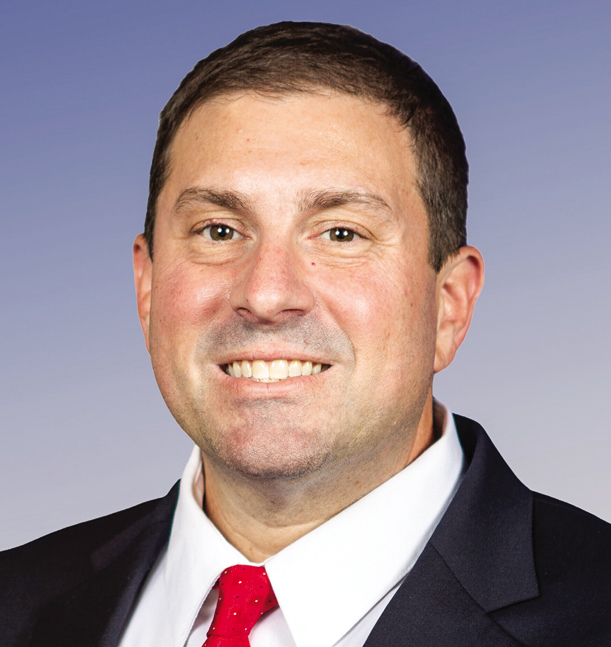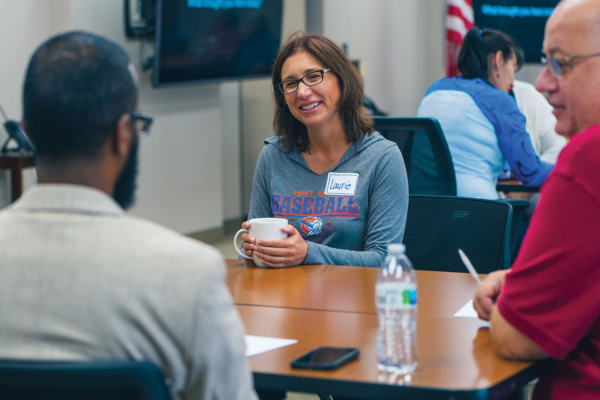A District’s Grow-Your-Own Route to Special Education Staffing
May 01, 2024
A finely tailored alternative licensure cohort has turned around St. Vrain’s recruitment and retention in a common shortage field
In response to the growing demand for special education teachers, our school system located north of Denver, Colo., devised systemic initiatives that have reduced staff turnover and created a pool of well-prepared teachers through an alternative licensure program.
Ali Thomas is one such product of that new route. Now completing her third year as a special education teacher at Thunder Valley K-8, a high-needs school serving students from kindergarten through the 8th grade, Thomas is demonstrating what staff continuity can bring to the instructional program and to student learning.
Before she joined the team-teaching staff, the school struggled to retain a middle school special education teacher, with turnover of four teachers over the previous five years.
Thomas completed the alternative program for licensing at Metropolitan State University in Denver, taking classes at night over two years while teaching full time. She finished with a certification in special education and a master’s degree.
As part of a co-taught English language arts class at Thunder Valley, Thomas has put in place a transformative instructional model, benefiting 6th and 8th graders primarily. In collaboration with general education English teachers, she co-plans and co-teaches at a school where 57 percent of the student population qualifies for free and reduced-price lunches.
Her students acknowledge her as their most dedicated advocate. Her consistent presence with her students over the long term has been impactful, creating a sense of stability for her students. St. Vrain’s philosophy is that students with disabilities should be educated with their peers in their neighborhood school unless their needs are better addressed through a more specialized educational environment.
Thomas describes her classroom experiences as “awesome,” explaining that her students “know what to expect and that I am here to help them and also that I am here to stay.”
She is one of many success stories as a result of this model program for addressing a key personnel need.
This Content is Exclusive to Members
AASA Member? Login to Access the Full Resource
Not a Member? Join Now | Learn More About Membership
Growing Your Own Leverages Local Talent
By James F. Lane and Lisa D. Rollins
 Sixty percent of teachers in the United States work within 20 miles of where they went to school. That incredible statistic helps explain why school leaders are looking increasingly to nurture local talent to solve staffing shortages.
Sixty percent of teachers in the United States work within 20 miles of where they went to school. That incredible statistic helps explain why school leaders are looking increasingly to nurture local talent to solve staffing shortages.
We’ve had the privilege of hearing from educators across the country about our organization’s Educators Rising program (educatorsrising.org). A career and technical student organization, EdRising embodies the Grow Your Own philosophy of leveraging local knowledge and connections to offer students practical teaching experiences while still in high school.
During a recent EdRising webinar on grow-your-own initiatives, four educators — Lori Bowen, director of educator development in the Fayette County, Ky., School District; Michael Hill-Shaner, a staff member with the Delaware Department of Education; and Bob Weir and Genna Adams, superintendent and teacher training instructor, respectively, with Valley Academy for Career and Technology Education in Cottonwood, Ariz. — shared their experiences in creating and managing teacher preparation pathways.
Field Observations
The panelists stressed the importance of recognizing there are many variations of grown-your-own teacher programs. “No one program is going to be the same,” says Hill-Shaner, who earlier worked in special education leadership in Smyrna, Del. “Take ideas from everyone around you and make it your own.”
Several other points emerging from the panelists’ experiences were these.
Where there’s a will, there’s a (fiscal) way.
Significant state and federal funding sources are available for grow your own, including Title II, the Carl D. Perkins Vocational and Technical Education Act and ESSER. Fayette County, Ky., launched its program using American Rescue Plan funds. Valley Academy, which specializes in career and technical education, uses school-based funding. Hill-Shaner, who oversees EdRising programs in Delaware, relies mainly on Perkins dollars. (His practice of hiring students through the staffing provision of the federal act allows them to be paid for their clinical experiences.)
Grow your own programs can help meet your strategic goals.
A core component of EdRising is to help districts develop a staff as diverse as the students they serve. Fayette County, based in Lexington, Ky., is offering pre-educator classes at all of the district’s high schools, with teacher leaders recruiting from groups traditionally underrepresented in the education profession. Last summer, about two dozen students served as teacher assistants in a district summer school program. All were male students of color, an intentional move.
“We hoped to have 25 kids, and we had 122 applications to serve in summer sessions,” says Bowen, whose role is part of Fayette County’s human resources department. Each student was mentored by a veteran educator of color, and most said the experience had cemented their decision to pursue a teaching degree.
Based on the National Board for Professional Teaching Standards and seven cross-cutting themes, the curriculum introduces aspiring educators to the hallmarks of effective instruction and includes resources to guide students through their clinical experiences.
Grow your own programs elevate effective teachers and expand their influence.
At Valley Academy, students observe classrooms throughout the school district before receiving their own teaching internship placement.
Weir, the superintendent, explains: “We want people with passion and people who believe in growing their own. We love where we live here. We want our community to thrive, so we want our kids to stay.” Seeing highly effective teachers in action is inspiring for students, he adds.
Students have a built-in support system within their local school district and through EdRising, which offers students a chance to sharpen their skills through conferences, competitions and leadership training.
“They are getting skill sets that other kids aren’t being exposed to,” Adams, of Valley Academy, says. Plus, dually enrolled students can earn up to 18 college credits before high school graduation. Just four years after its launch, schools in the area already employ program graduates.
Elevating the Profession
In an Education Week national poll, superintendents identified staffing shortages as a key barrier to achieving school district goals. Grow Your Own programs offer a solution and provide an opportunity to elevate the profession.
In Fayette County, Bowen says school system leaders “want to support future educators to help them to see this is a noble career path and one that’s very rewarding.”
Her advice to districts interested in starting their own pathway? “Tap people on the shoulder who are thriving in this profession and want to see it continue to be the most important profession,” she says.
James Lane is the CEO of PDK International and Educators Rising in Arlington, Va. LISA ROLLINS is the national director of outreach and engagement at PDK.
Advertisement
Advertisement
Advertisement
Advertisement



